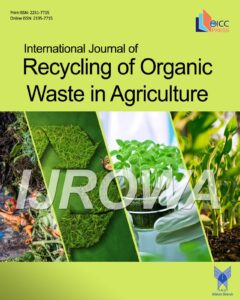Effect of the application of compost as an organic fertilizer on a tomato crop (Solanum lycopersicum L.) produced in the field in the Lower Valley of the Río Negro (Argentina)
Authors
-
Francisco J. Garcia-Navarro
 1
1
-
Raimundo Jimenez-Ballesta
 2
2
- Emanuel Vela 3
- Omar Gajardo 3
- Luis Albrecht 3
- Gabriela Aschkar 4
- Amelia Chrorolque 3
-
Francisco J. Garcia-Navarro
 1
1
-
Raimundo Jimenez-Ballesta
 2
2
Abstract
Purpose The main objective of the study was to evaluate the application of different doses of onion residue compost as mixtures with bovine manure as organic fertilizers for a round tomato crop planted in the field.
Method The data were obtained experimentally in pilot fields. The experimental design was completely randomized, with 4 m2 plots with ten plants each as an experimental unit and with three replications per treatment (2 years). Five treatments were tested, namely one unfertilized control, three with organic fertilization and one mineral treatment. The variables measured were plant height (cm), stem base diameter (cm), fresh plant weight (g) and total dry matter (%). The parameters measured for the fruit were fresh fruit weight (g), fruit length (mm), fruit width (mm) and total soluble solids.
Results The application of compost from the degradation of onion residues as mixtures with cow manure had positive effects on the growth of the plant and on the development of tomato fruit. Compost doses of 60 Mg ha–1 and 80 Mg ha–1 gave similar values to chemical treatment and the control without fertilization was significantly lower than those with doses of organic and chemical fertilizer. These results indicate that this compost contains the nutrients required by the tomato crop for growth and development.
Conclusion It was concluded that the agricultural use of quality compost is an effective strategy to obtain high quality products in an economically viable and environmentally sustainable way.



